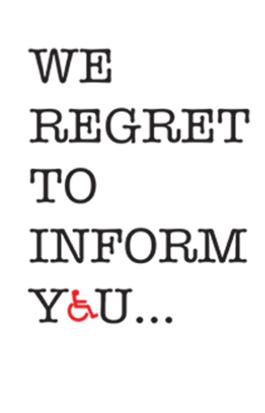We Regret to Inform You...
In a check-box society that functions by dividing us into neatly-defined categories, where does someone with a strong mind and a weak body fit in? Dr. Heidi Janz - award-winning playwright, accomplished academic, and self-described ‘crip’ – has a curious problem. Despite her obvious physical limitations she is denied financial assistance from government programmes because of her “productive” mind. Following Heidi through her everyday life, with all its unique responsibilities, opportunities, and challenges, We Regret to Inform You... offers an unsentimental, and unapologetic, look at what it means to be both “disabled” and “productive”.
In a check-box society that functions by dividing us into neatly-defined categories, where does someone with a strong mind and a weak body fit in? Dr. Heidi Janz - award-winning playwright, accomplished academic, and self-described ‘crip’ – has a curious problem. Despite her obvious physical limitations she is denied financial assistance from government programmes because of her “productive” mind. Following Heidi through her everyday life, with all its unique responsibilities, opportunities, and challenges, We Regret to Inform You... offers an unsentimental, and unapologetic, look at what it means to be both “disabled” and “productive”.
-
écritureEva ColmersHeidi Janz
-
réalisateurEva ColmersHeidi Janz
-
producteurBonnie Thompson
-
producteur exécutifDavid Christensen
-
monteurScott Parker
-
directeur de la photographieaAron Munson
-
photographie additionnelleJimmy BustosScott Parker
-
preneur de sonLarry MacDonald
-
producteur postproduction audioJohn BlerotMike Sanders
-
compositionEverett LaRoi
-
musicienEverett LaRoi
-
NoneSharon Murphy
-
voix hors-champMelissa Thinglestad
-
participantHeidi JanzCarlene BelleroseTyler MunroPat LangnerVern ThiessenStacy CabralAwkward Parker-Janz
-
colorationHerman Ansink
-
monteur en ligneKody Davidson
-
conception graphique en mouvementKim Clegg
-
administrateur de programmeGinette D'Silva
-
coordonnateur de productionFaye YonedaJasmine Pullukatt
-
agent, marketingLeslie Stafford
-
superviseur de productionMark Power
-
gestionnaire des opérations du CentreDarin Clausen
Ce film convient parfaitement aux dissertations, aux débats et aux discussions en classe sur le rôle du gouvernement dans l’offre de programmes sociaux et de soins de santé. Expliquez la situation de Heidi Janz et la raison pour laquelle elle a besoin de l’aide du gouvernement. Quelle est la responsabilité du gouvernement à l’égard d’une personne comme Heidi Janz en matière de soutien financier, de soutien médical, de soins infirmiers, de prestations aux aidants naturels et d’autres formes de soutien? Si les budgets alloués aux programmes d’aide sociale sont limités, comment déterminons-nous qui est admissible aux prestations et qui ne l’est pas?
Plus de contenu éducatif
We Regret to Inform You..., Eva Colmers et Heidi Janz, offert par l' Office national du film du Canada
